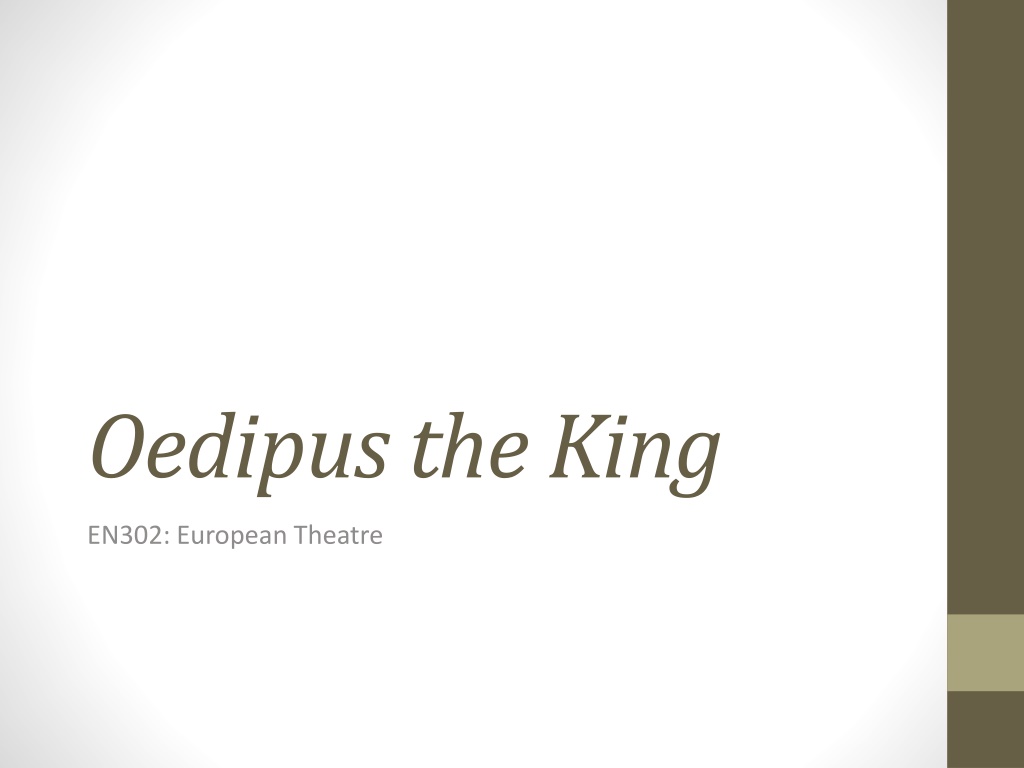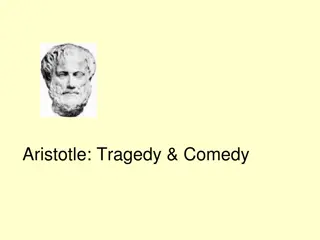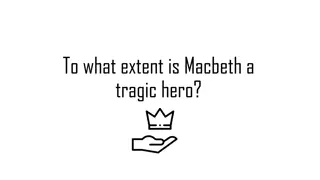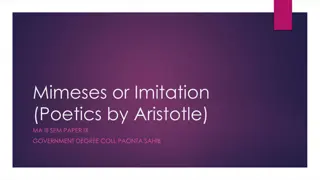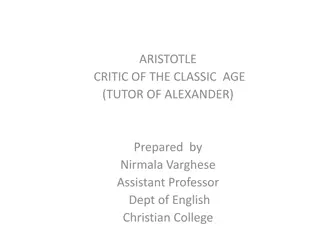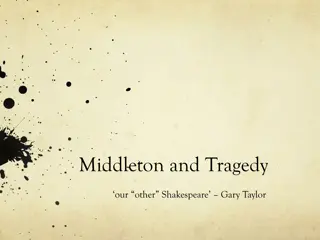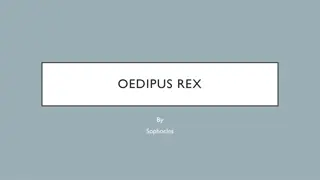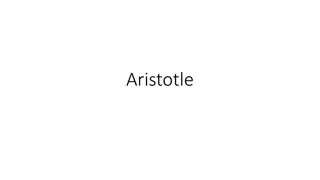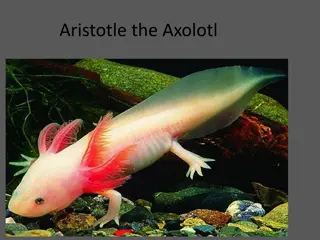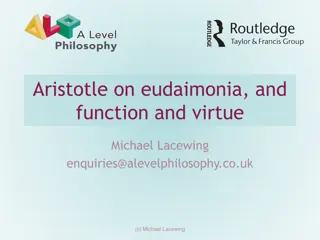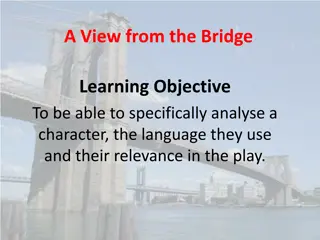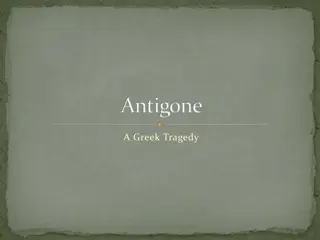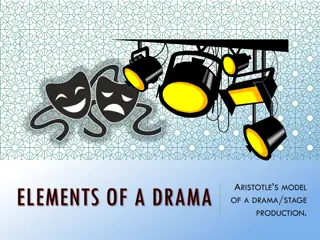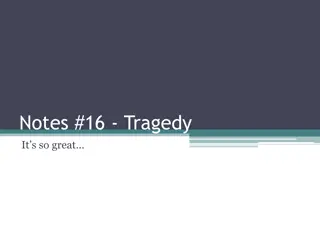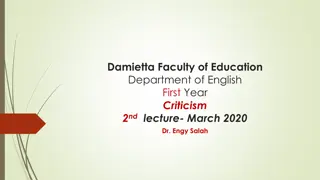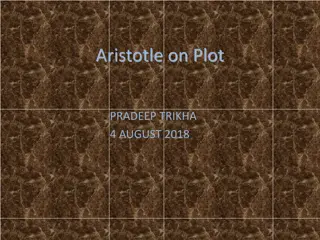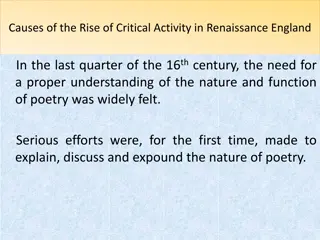Analysis of Blame and Tragedy in Oedipus the King and Aristotle's Poetics
The question of blame is central in "Oedipus the King," where the city faces a plague and seeks accountability. Aristotelian concepts of tragedy, as outlined in "Poetics," delve into the structure and components of a tragic work, emphasizing plot development and cathartic emotions of pity and fear. Aristotle's view on causality underscores the importance of a well-structured plot. These literary analyses invite reflection on fault, fate, and narrative construction in tragic storytelling.
Download Presentation

Please find below an Image/Link to download the presentation.
The content on the website is provided AS IS for your information and personal use only. It may not be sold, licensed, or shared on other websites without obtaining consent from the author. Download presentation by click this link. If you encounter any issues during the download, it is possible that the publisher has removed the file from their server.
E N D
Presentation Transcript
Oedipus the King EN302: European Theatre
Who is to blame? This question is posed at the start of the play: Priest. The whole city drowns And cannot lift its hand from the storm of death In which it sinks: the green corn withers In the fields, cattle die in the meadows, Our wives weep in agony, and never give birth! (p. 185) Creon. Our land is tainted. We carry the guilt in our midst. A foul disease, which will not be healed unless We drive it out and deny it life. (p. 188) [Note the Plague of Athens, 430 BC, probably around a year before Oedipus the King was first performed.] The question of blame is actually harder to answer than it seems
Aristotles Poetics(c. 350 BC) Earliest known work of dramatic criticism, and indeed of literary criticism in general (unless one counts The Frogs by Aristophanes ) The surviving parts of the Poetics focus on Tragedy and Epic Poetry Note chronology Aristotle was writing analytically, not prescriptively
Aristotles definition of tragedy Tragedy, then, is an imitation of an action that is serious, complete, and of a certain magnitude; in language embellished with each kind of artistic ornament, the several kinds being found in separate parts of the play; in the form of action, not of narrative; through pity and fear effecting the proper purgation [catharsis] of these emotions. (Part VI) Fear and pity may be aroused by spectacular means; but they may also result from the inner structure of the piece, which is the better way, and indicates a superior poet. For the plot ought to be so constructed that, even without the aid of the eye, he who hears the tale told will thrill with horror and melt to pity at what takes place. This is the impression we should receive from hearing the story of the Oedipus. (Part XIV)
Aristotles definition of tragedy Every Tragedy [ ] must have six parts, which parts determine its quality namely, Plot, Character, Diction, Thought, Spectacle, Song. most important of all is the structure of the incidents. For Tragedy is an imitation, not of men, but of an action and of life, and life consists in action, and its end is a mode of action, not a quality. Now character determines men s qualities, but it is by their actions that they are happy or the reverse. Dramatic action, therefore, is not with a view to the representation of character: character comes in as subsidiary to the actions. Hence the incidents and the plot are the end of a tragedy; and the end is the chief thing of all. (Part VI)
Aristotle and causality For Aristotle, then, the proper structure of the Plot was the first and most important thing in Tragedy : A beginning is that which does not itself follow anything by causal necessity, but after which something naturally is or comes to be. An end, on the contrary, is that which itself naturally follows some other thing, either by necessity, or as a rule, but has nothing following it. A middle is that which follows something as some other thing follows it. A well constructed plot, therefore, must neither begin nor end at haphazard, but conform to these principles. (Part VII)
Aristotle and causality Aristotle valued a structural union of the parts [ ] such that, if any one of them is displaced or removed, the whole will be disjointed and disturbed (Part VIII). Of all plots and actions the episodic are the worst. I call a plot episodic in which the episodes or acts succeed one another without probable or necessary sequence. (Part IX)
Peripeteiaand Anagnorisis the most powerful elements of emotional interest in Tragedy Peripeteia or Reversal of the Situation, and Recognition scenes [Anagnorisis] are parts of the plot. (Part VI) Reversal of the Situation is a change by which the action veers round to its opposite, subject always to our rule of probability or necessity. Thus in the Oedipus, the messenger comes to cheer Oedipus and free him from his alarms about his mother, but by revealing who he is, he produces the opposite effect. (Part XI) Teiresias. He will be blind though now he sees; a beggar Though now he is rich, and he will go feeling Strange ground before him with a stick. He is a father to children then he will Be called their brother; he is his mother s son Then he will be called her husband, then He will be called his father s murderer. (p. 201)
Peripeteiaand Anagnorisis Recognition, as the name indicates, is a change from ignorance to knowledge, producing love or hate between the persons destined by the poet for good or bad fortune. The best form of recognition is coincident with a Reversal of the Situation, as in the Oedipus. [ ] This recognition, combined with Reversal, will produce either pity or fear; and actions producing these effects are those which, by our definition, Tragedy represents. (Part XI)
Peripeteiaand Anagnorisis One can think of Oedipus the King as being structured around a series of realisations: Oedipus s realisation that he killed Laius (https://youtu.be/6lSMs3CSyNQ?t=2600 compare other film at 39 mins) Oedipus s discovery that Polybus was not his father, and Jocasta s realisation of her true relationship with Oedipus (https://youtu.be/TonLOAkc1OY?t=3306 compare other film at 1.04 mins) Oedipus s own realisation that he has killed his father and married his mother (at 1.12 and 1.06 mins respectively) (Film clips are from Philip Saville, 1968, and Tyrone Guthrie, 1957, respectively)
Seeking truth Teiresias the prophet Oedipus the riddle-solver (the story of the Sphinx) Oedipus. He must be found at once; My queen, as I look into myself I begin to fear; I had no right to say those things, and so I must see this man. (p. 214)
Seeking truth Oedipus attitude towards the truth contrasts with other characters: Teiresias. When truth cannot help The man who knows, then it brings terror. I knew That truth, but I stifled it. I should not have come. (p. 196) Creon. If I cannot know the truth I would rather be silent. (p. 206) Jocasta. Think nothing of this! Do not idle with memories and stories (p. 226) Shepherd (to the Messenger). Damnation seize you! Can you not keep your secret? (p. 230) Shepherd (to Oedipus). No more, your majesty, no more questions! (p. 231)
Seeking truth How truth is characterised over the arc of the play: light (p. 187) stubborn (p. 188) terror (p. 196) both parent and murderer (p. 201) no comfort (p. 202) Oedipus (to Teiresias). You live in perpetual night; you cannot harm Me, nor anyone who moves in the light. (p. 198) After his final anagnorisis, Oedipus says, Light, / Now turn back and die (p. 233). At end, Oedipus is In his blackness (p. 235) and in a cloud of darkness (p. 237).
Seeking truth Does Freud help? Is this play about the unconscious? Jocasta. Many Men have dreams, and in those dreams they wed Their mothers. (p. 222) Freud on the play s structure: The action of the play consists in nothing other than the process of revealing, with cunning delays and ever-mounting excitement a process that can be likened to the work of a psychoanalysis that Oedipus himself is the murderer of Laius. (1900: 261-2) Think about Jocasta s speech, in which she mentions her son s chained ankles (p. 212). Oedipus knows about the scars on his own ankles, yet he does not seem to realise here. Later, when the Messenger confirms that he found Oedipus as an infant with his feet pierced / And clamped together , Jocasta realises, but Oedipus still does not, clinging to the idea that he might be of humble birth.
Aristotle: some misconceptions Contrary to popular belief, Aristotle did not advocate the three unities of time, place and action this idea derives from a mistranslation of his work put about during the Renaissance period. While he certainly favoured a unified plot, he has nothing to say about the unity of place, and only this to say about time: Tragedy endeavours, as far as possible, to confine itself to a single revolution of the sun, or but slightly to exceed this limit, whereas the Epic action has no limits of time. (Part V) A thornier issue, which may or may not be a misconception (depending on who you ask), is the idea of the fatal flaw
Hamartia N.B. This is still in the section on Plot, before Aristotle gets to Character: It follows plainly, in the first place, that the change of fortune presented must not be the spectacle of a virtuous man brought from prosperity to adversity: for this moves neither pity nor fear; it merely shocks us. Nor, again, that of a bad man passing from adversity to prosperity, [which] neither satisfies the moral sense nor calls forth pity or fear. Nor, again, should the downfall of the utter villain be exhibited. (Part XIII) There remains, then, the character between these two extremes that of a man who is not eminently good and just, yet whose misfortune is brought about not by vice or depravity, but by some error or frailty [hamartia]. He must be one who is highly renowned and prosperous a personage like Oedipus, Thyestes, or other illustrious men of such families. The change of fortune should be not from bad to good, but, reversely, from good to bad. It should come about as the result not of vice, but of some great error or frailty, in a character either such as we have described, or better rather than worse. (Part XIII)
Oedipus hamartia Does the tragedy happen because of Oedipus own fatal flaw ? If so, what is it? Hubris? Oedipus. Now You will see the measure of my power; I come to defend you, Avenging your country and the god Apollo. (p. 190) Creon (to Oedipus). when you force your way against the world You crush us all beneath you. (p. 210)
Oedipus hamartia Hubris (continued)? Chorus. All actions must beware of the powers beyond us, and each word Must speak our fear of heaven. ... The laws that hold us in subjection Have always stood beyond our reach Yet man desires to be more than man, to rule His world for himself. ... Time will come with cruel vengeance on the man Who disobeys, that is the punishment For those who are proud and are more than men They are humbled. (pp. 217-18) Oedipus. Oh look, look, who would listen to Apollo Talking in his shrine at Delphi, or notice birds That clamour to the air? They were the signs That told me and I believed that I would kill My father. (p. 221)
Oedipus hamartia Quickness to anger? Oedipus. In a rage I struck The one who touched me, the servant at the wheel. [ ] Slashing with my stick I cut at him And my blow tumbled him backwards out of the chariot Then I killed them all! (216)
Oedipus hamartia Quickness to anger? Oedipus (to Teiresias). Listen, I know What you are. I see now that you conspired to plan This murder, and you committed it all but the stroke That killed him. If you had eyes, I would have said The crime was yours alone. (p. 197) Oedipus (to Creon). Your eyes have great Courage they can look on my palace out of a murderer s Face, a robber s face! Yes, I know you; You blaze, you thief of power In heaven s name Tell me: when you planned to kill me, did you think I had Become a coward or a fool? (p. 204)
Oedipus hamartia But the idea that Oedipus is doomed by a fatal flaw (whatever it may be) is rather undermined by the play itself: Oedipus does not realise he has any of these faults at the end of the play, merely that he has killed his father and married his mother. Is Oedipus hamartia more in the category of a fatal error , then? Isabel Hyde argues as much in her essay The Tragic Flaw: Is It a Tragic Error? : To begin with Aristotle s pattern play, the Oedipus Tyrannus, it is evident that the hamartia of Oedipus is [ ] an error which consisted of Oedipus ignorance of his true parentage. His strength and weakness of character, namely his courage and intelligence and his hastiness, then cause him to act in a particular, and fatal, way but it is the acting in blindness to his own harm which is the mainspring of the tragedy, providing the particular tragic irony which is associated with Sophocles tragic vision. (1963: 323-4)
Oedipus hamartia Hyde again: Instead of searching for tragic flaws in both the heroes of tragedies and the supporting characters [ ] it is far more fruitful to translate hamartia as error and interpret it as the precipitating action, or erroneous step, taken in ignorance [ ] which leads eventually to the tragic catastrophe. (1963: 324) What, then, is Oedipus fatal error? His accidental condemnation of himself? ( No one must shelter him or speak to him He carries the taint of corruption , p. 193) His belief that Polybus and Merope were indeed his mother and father? His failure to follow through on his early suspicions? His (or his parents ) attempts to thwart the will of Apollo? His determination to find the truth?
Apollo and predestination According to another reading of the play, the terrible events are not Oedipus fault at all he is simply a puppet manipulated by the cruelty of the gods. Oedipus. My Lord Apollo, let his news be the shining sun That answers our prayers and guides us out of death! (p. 187) Chorus. Apollo sent the reply, and Apollo Should find the murderer. Oedipus. Yes, we believe it is Apollo s task but we cannot make The gods our slaves; we must act for ourselves. (p. 194)
Apollo and predestination Chorus. Apollo, the son of Zeus, leaps down on him, Armed with lightning, dressed in fire, And the terrible avengers follow where he goes, The Furies who never mistake and are never cheated. (p. 282) Chorus. Every man who has ever lived Is numbered with the dead; they fought with the world For happiness, yet all they won Was a shadow that slipped away to die. (p. 233) Oedipus (at the end). Apollo, my lords, Apollo sent this evil on me. I was the murderer; I struck the blow. Why should I Keep my sight? (p. 237)
Predestination and hamartia But are free will and prophecy necessarily incompatible? Does Apollo control events, or do his oracles merely accurately predict them? E. R. Dodds argument finds a balance: Sophocles has provided a conclusive answer to those who suggest that Oedipus could, and therefore should, have avoided his fate. The oracle was unconditional (line 790): it did not say If you do so-and-so you will kill your father ; it simply said You will kill your father, you will sleep with your mother. And what an oracle predicts is bound to happen. (1966: 41) But, Dodds continues, what is the alternative? If Oedipus is the innocent victim of a doom which he cannot avoid, does this not reduce him to a mere puppet? Is not the whole play a tragedy of destiny which denies human freedom? (1966: 42)
Predestination and hamartia Dodds thinks not: on the contrary, what fascinates us is the spectacle of a man freely choosing, from the highest motives, a series of actions which lead to his own ruin. what causes his ruin is his own strength and courage, his loyalty to Thebes, and his loyalty to the truth. (1966: 43) Adrian Poole: The tragic hero is a sacrifice, a means of appeasing the forces that rule the world and keeping at bay the fears they inspire in us. (2005: 51)
Tragic hero as scapegoat Ren Girard describes Oedipus as a prime example of the human scapegoat : At the conclusion of his drama Sophocles has Oedipus address the Thebans in the terms best calculated to quell their doubts and fears. He assures them that all the evils abroad in the community are the sole responsibility of the surrogate victim, and that he alone, as that victim, must assume the consequences for these ills: Believe me, you have nothing more to fear. My ills are mine alone, no other mortal is fit to bear them. Oedipus is indeed the responsible party, so responsible that he frees the community from all accountability. (2013: 87)
References Dodds, E. R. (1966) On Misunderstanding the Oedipus Rex , Greece & Rome 13: 1, pp. 37-49. Hyde, Isabel (1963) The Tragic Flaw: Is It a Tragic Error? , The Modern Language Review 58: 3, pp. 321-5. Freud, Sigmund (1900) The Interpretation of Dreams, London: Hogarth. Girard, Ren (2013) Violence and the Sacred, trans. Patrick Gregory (1977), London: Bloomsbury. Poole, Adrian (2005) Tragedy: A Very Short Introduction, Oxford: Oxford University Press.
